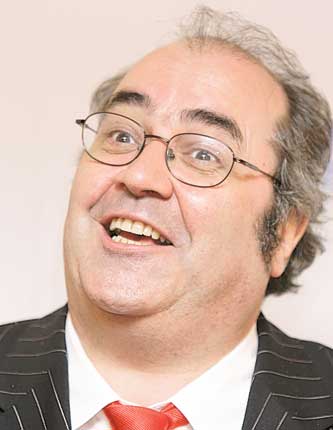Terence Blacker: Time for us all to de-clutter our brains
Social Studies

The good news is that the practice of "irrigating" the colon, an undignified procedure once popularised by the Princess of Wales, has been shown to be a harmful bit of nonsense. Having a tube inserted into oneself in order to flush out toxins turns out to have been every bit as silly as it sounds.
Unfortunately, another part of the body needs attention. In a new book called Work Meets Life, one of its co-authors, the Cambridge neurobiologist Professor Simon Laughlin, suggests that, in evolutionary terms, the human brain may now have reached its capacity. Accounting for 2 per cent of a body's weight, it expends 20 per cent of its energy.
The cranial crisis, it turns out, is not unlike the global one. The 21st-century brain has used up the space available to it and has a growing energy problem. Humans may, in fact, need to get slightly stupider in order to survive. In the words of another expert in the field, "it is clear that there are tight constraints on intelligence".
Setting aside the tempting conclusion that these constraints are too visible already, there appears to be a personal challenge here. Just as impressionable souls once believed that colonic irrigation drained poisons from the body, we now need to rid our brains of their waste material. It is a form of mental composting, which involves separating out unnecessary areas of knowledge, interests and curiosities, and chucking them into the slop-bucket of oblivion. For some of us de-cluttering happens naturally, but there is still room for additional energy-saving.
Imagine, for example, the space cleared in one's mind by simply putting aside a book at the moment when it has begun to bore or irritate one, or turning off Newsnight when it moves into effortfully facetious mode, or not bothering to worry about things over which one has no control – the American economy, the schism in the Church of England, what will now happen to Rebekah Brooks.
Further energy savings could be made by those who are addicted to revealing banal private information on social networking sites, although the compulsion to overshare online is so powerful that this form of de-cluttering should be taken in stages. When enjoying a moment of quiet contentment in the garden or having coffee with a friend, try to resist reaching for a smartphone and delivering to Twitter or Facebook an ecstatic account of what you are experiencing, particularly if it ends with the one-word sentence "Bliss". Once you gradually cut back on this kind of online exhibitionism – "flashing", as it is technically known – you not only reduce your own mental clutter but that of your friends, too.
More clearance can be achieved by barring certain public figures from one's brain. Personally, my life has been significantly improved since I decided to allow no further thoughts about Piers Morgan, Jeremy Clarkson, Dawn French, Nadine Dorries and Alan "Chatty Man" Carr. I find I think more clearly now that I have stopped worrying why apparently sane people find Harry Hill, Reeves and Mortimer, and Miranda Hart funny.
Finally, any topic which is said to be the result of "blue-sky thinking" can go straight to the slop-bucket: it is invariably faddish – more attention-seeking than real thought.
It is a marvellous process. Already your mind is being drained of toxins. There are significant energy savings to your body and benefits to your mental environment. Look around your brain. The grey fuzz caused by the vapidity of modern life is beginning to clear. Sunshine is coming through.
Reasons to be cheerful
A startlingly original idea has been gaining currency in recent weeks. It is that happiness, as well as being desirable in itself, offers a pathway to achievement. "Being upbeat is the key to life," Sir David Frost said in a recent interview, and his career, built on sharpness and bounce, confirms the point.
An even more persuasive and radical proponent of the benefits of happiness is the brilliant broad-caster Danny Baker who, on this week's Desert Island Discs, provides a master-class in cheerfulness. In spite of having experienced several significant setbacks – he has just recovered from cancer of the head and neck – Baker was bracingly and un-self-consciously positive.
It was significant that all the records he chose were from the pre-rock age of Tommy Steele, Bernard Cribbins, Dean Martin and Helen Shapiro, before the arrival in the 1960s of a sort of miserabilism which has grown worse in the subsequent decades. "To be extraordinarily happy and to have no concern for money drives some people nuts," Baker said. It also takes courage.
Activity may be bad – but it can also pay
August is a moment of peak activity for the promotional survey, those quasi-academic reports which claim to provide a new insight into human activity. This weekend we learnt that children with busy schedules of activities miss out on family life. Eighty-four per cent of parents believed that activities were helpful. In 40 per cent of households, more than 10 hours a week are spent on homework. Who was behind this worthy report? Step forward, Weetabix, who are sponsoring children with “hectic social lives” to wear T-shirts promoting its brand. A child can earn £242 if it agrees to buzz around like a little sandwich-board man. Presumably there is a connection between a survey pointing out that too much activity is harmful and a marketing campaign which uses active children. I wish someone would explain it to me.
Join our commenting forum
Join thought-provoking conversations, follow other Independent readers and see their replies
Comments
Bookmark popover
Removed from bookmarks